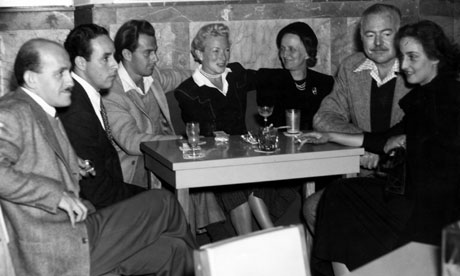
The tears Ernest Hemingway shed over the death of his cat are revealed in previously unseen letters which show the bull-fighting aficionado's sentimental side.
The 15 letters, which have just been unveiled by the John F Kennedy Presidential Library and Museum, were written by the Nobel prize-winning author to his good friend Gianfranco Ivancich. Hemingway first met Ivancich, who was 20 years younger than the author, at a Venice bar in January 1949. They bonded over the serious leg wounds both had received during the war. When Ivancich found work in Cuba, he stayed with Hemingway at the writer's house, the Finca Vigía, and the visit in 1950 of Ivancich's sister, Adriana, is believed to have inspired the Hemingway creative period that gave rise to The Old Man and the Sea. Ivancich and Hemingway kept up a close friendship through letter writing, until Hemingway's suicide in 1961.
Both handwritten and typed, their letters give an insight into the last years of Hemingway's life. The Kennedy library's director, Tom Putnam, called them "extraordinary", and said they would be a "treasure trove for new scholarship".
In February 1953, Hemingway wrote to Ivancich of his pain at having to shoot his cat, Willie, after it was hit by a car. "Certainly missed you. Miss Uncle Willie. Have had to shoot people but never anyone I knew and loved for eleven years. Nor anyone that purred with two broken legs," wrote the author, also revealing the heartless behaviour of a group of tourists who arrived at his house the same day. "I still had the rifle and I explained to them they had come at a bad time and to please understand and go away. But the rich Cadillac psycho said, 'We have come at a most interesting time. Just in time to see the great Hemingway cry because he has to kill a cat.'"
By April, Hemingway was in a better mood, telling Ivancich of a trip with his wife, Mary, to Paraiso. "It was much better weather than last year and there were many more fish," he wrote. "We caught an average of 20 good fish a day; many beautiful big yellow tails and pargos. Not as many groupers (cherna) as last year. I trained hard and got in fine shape; no belly and indio tostado color. Mary was in wonderful shape too and very happy. She caught the most fish and that made her even happier. Fishing in the Tin Kid is certainly lots of exercise. I always think of you and the big marlin of last year."
His affection for Ivancich and his sister is evident in the letters, which are often signed "Papa", or "Mr Papa". In 1956 he told his friend: "We miss you very much and it is lonesome to have somebody around as you were and have them like a brother and have them go away. Now I have no brother and no good drinking friend nor hard-working banana grower. Everybody remembers you with so much affection and sends very best wishes."
Later, in 1958, he confesses to Ivancich: "I wish I could write you good letters the way you do. Maybe it is because I write myself out in the other writing." In 1960, the writing was clearly progressing well, as Hemingway wrote: "I have worked terribly hard – written over 100,000 words since the end of January and every day when finish too tired to write letters. Have the first draft of this about the bulls that comes after Death in the Afternoon done now."
The Kennedy library has also acquired from Ivancich's collection a manuscript of Hemingway's fable The Faithful Bull, which was written for Ivancich's young nephew, Gherardo Scapinelli. An extract in the author's scrawling, sloping handwriting reads: "'Perhaps we should all be faithful,' the matador said."

